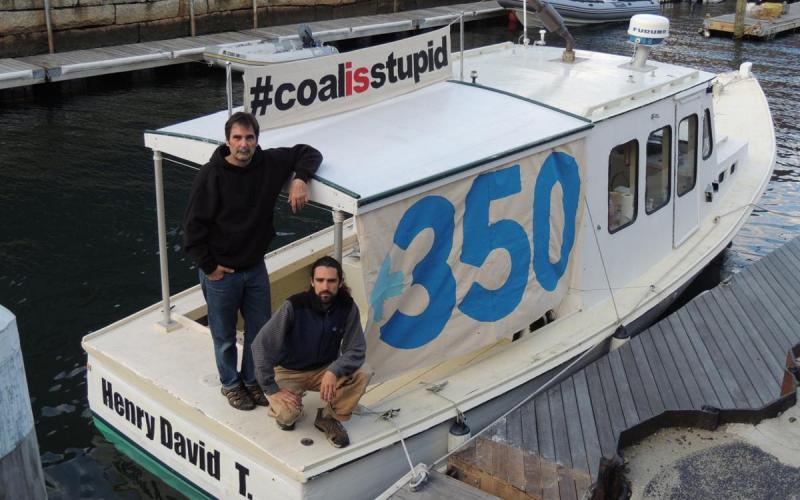As seen in the Boston Globe:
Bristol District Attorney C. Samuel Sutter knew the law. He also understood the threats posed by climate change. So for days he grappled with what to do about the two environmental activists facing criminal charges for blocking a 40,000-ton coal shipment to the Brayton Point power plant in Somerset MA. Just as the trial was about to begin Monday, Sutter decided to drop all charges.
Then, in a dramatic appearance at Fall River District Court, he said he empathized with the stance of Ken Ward and Jay O’Hara, who said they were acting to reduce harm to the planet when they used the lobster boat Henry David T. to block the shipment to the coal-burning plant. “Because of my sympathy with their position, I was in a dilemma,” Sutter said afterward. “I have a duty to go forward to some extent with this case and to follow the applicable case law, but they were looking for a forum to present their very compelling case about climate change.” He added: “I do believe they’re right, that we’re at a crisis point with climate change.” The turn of events stunned the activists, who faced up to two years in jail for attaching a 200-pound anchor to their keel to block the path of the coal ship.
They were planning a rare use of the so-called necessity defense and would have called a number of high-profile witnesses, including NASA climate scientist Jim Hansen and environmental activist and author Bill McKibben. In exchange for having the state drop charges of conspiracy to commit a crime, disorderly conduct, and motor boat violations, the men agreed to pay $2,000 each in restitution to Somerset and the State Police.
O’Hara, 32, a sailmaker from Bourne, said he had walked into the courtroom with “an open heart and mind to whatever path we would be taken. “I was prepared to face the judgment of a jury of our peers.” They were elated after their lawyers, who were working for free, told them about the deal and how they wouldn’t have to admit guilt. “I had a feeling of goodness in my heart that there are others in a position of authority that truly understand the magnitude of what we’re facing, and the means we need to go to to change the course,” O’Hara said. “This is the response we need to be getting from elected and appointed officials if we’re going to change our trajectory on the climate.”
Ward, 57, a carpenter from Corbett, Ore., called the outcome of the case “quite extraordinary.” “We lost an opportunity to educate the public, but we gained an extraordinary statement,” he said of Sutter’s abrupt decision to drop the charges. But Ward and O’Hara lament they have yet to accomplish their goal of shuttering the 51-year-old, 1,528-megawatt power plant, which is one of the region’s largest contributors to greenhouse gases.
The Somerset plant, which is in the process of being sold to Houston’s Dynergy Inc., is slated to close in 2017. “They’re still burning coal,” O’Hara said, noting the Brayton Point electricity-generating facility has increased its output in recent years. “Our effort was to shut this plant, and that hasn’t been achieved.” Plant officials did not return messages. In a telephone interview, McKibben, who is planning a major protest in New York City this month to coincide with a climate summit at the United Nations, called Sutter’s actions “remarkable.” “I was moved in a way that I can’t remember being moved by a public official in a long time,” he said. “It’s easy to get cynical about politicians, and then one of them shows a real maturity and grace.”
After dismissing the charges, Sutter walked up to a bank of microphones at the courthouse, holding a manifesto against climate change that McKibben wrote two years ago for Rolling Stone magazine. The district attorney vowed to join the “People’s Climate March” in New York, and said his decision to drop the charges “took into consideration the cost to the taxpayers in Somerset, but was also made with our concerns for their children, and the children of Bristol County and beyond, in mind. “Climate change is one of the gravest crises our planet has ever faced,” Sutter said. “In my humble opinion, the political leadership on this issue has been sorely lacking.”
Afterward, he said wasn’t concerned that he and other prosecutors would be facing a flood of similar cases of activists breaking the law. “This resolution today only sets a precedent within Bristol County for a case almost identical to this,” he said. “There is only a precedent for almost identical facts.” Sutter said it wasn’t unusual for his office to wait to the last minute before dropping charges. “We have quite a lot going on at the DA’s office,” he said.
When asked whether his abrupt decision, which pleased environmental activists around the country, was meant to help him get their votes in case he ran for higher office, Sutter said he was acting on his convictions. Sutter ran for Congress in 2012 but lost in the Democratic primary to William Keating. He has also mentioned an interest in running for attorney general. “When an opportunity appears, I am interested in doing something other than district attorney with my career,” said Sutter, who has held his office for nearly eight years and is running unopposed for reelection this fall, “but I spoke from the heart. I thought carefully about every word that I chose. I think it’s one of the greatest crises our planet faces.” When he was done speaking at the courthouse, Sutter shook hands with Ward and O’Hara.

